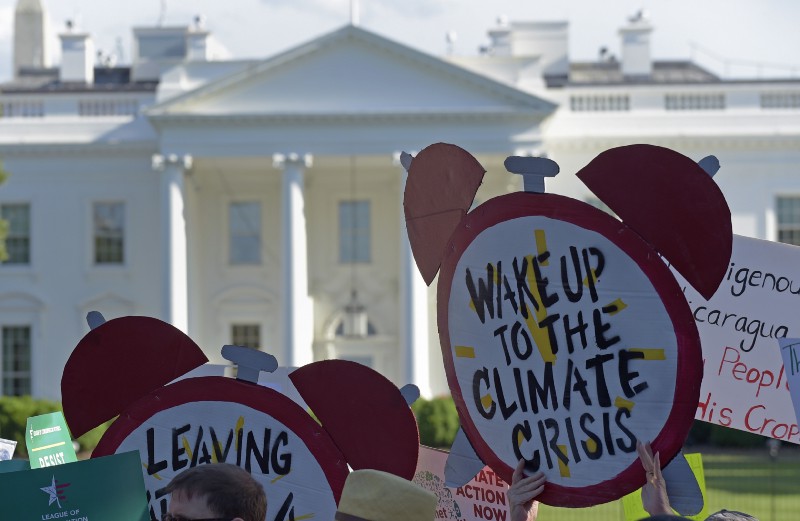The House of Representatives passed a resolution Thursday to denounce a carbon tax, with almost all of the Republican members of a House climate caucus — and even one Democratic member — voting in favor of the measure.
The resolution, sponsored by House Majority Whip Steve Scalise (R-LA), stated that a tax on emissions of carbon dioxide — the most prevalent greenhouse gas that causes climate change — “would be detrimental to American families and businesses, and is not in the best interest of the United States.”
The nonbinding measure passed 229-180, with two members voting present. If every member of the Climate Solutions Caucus had voted against the resolution and the Democrats had remained united against it, the resolution would have easily failed. And even if only two-thirds of the Republican caucus members voted against it, the resolution also would have fallen to defeat.
Instead, only six Republicans voted against the anti-carbon tax resolution, including four GOP members of the Climate Solutions Caucus: Reps. Carlos Curbelo (FL), Brian Fitzpatrick (PA), Mia Love (UT), and Ileana Ros-Lehtinen (FL). The other 39 Republican members of the caucus voted to denounce a tax on carbon emissions. Another Republican caucus member, Rep. Ryan Costello (PA), who is not seeking reelection, voted present.
Rep. Stephanie Murphy (D-FL) was the only Democratic member of the caucus to vote in favor of the anti-carbon tax resolution. Murphy’s office had not responded to a request for comment on why she voted for the resolution at the time this article was published.
Support of the resolution among Republican caucus members rankled climate activists.
“The caucus is a joke, or it would be were climate change not so serious,” RL Miller, co-founder of Climate Hawks Vote, said Thursday in a statement. Climate Hawks Vote is a grassroots-funded group that supports candidates and elected officials whom it identifies as making climate change a top priority.
“We don’t want to reason with Republicans dominated by the fossil fuel industry. We don’t want them to be stakeholders at a table. We just want to vote them out,” Miller added.
Reps. Alan Lowenthal (D-CA) and Don Beyer (D-VA), both of whom are members of the caucus, noted that the resolution passed during the same week that research was released stating a carbon tax could be implemented without hurting the economy.
“For decades, economists across the ideological spectrum have argued that carbon pricing is the most efficient way to discourage the use of fossil fuels and to energize the growth of energy efficiency measures, alternative energy sources, and market decisions on everything from housing to transportation,” Lowenthal and Beyer said in a statement.
“History will look back on this House resolution with sadness and regret. Once again, Republicans have chosen short-term profits of the fossil fuel titans over the long-term survival and prosperity of mankind,” the Democratic lawmakers said.
The Citizens’ Climate Lobby, a group that played a leading role in the creation of the Climate Solutions Caucus, put a positive spin on the failure of the caucus to unite against the resolution.
“The fact that six Republicans voted ‘no’ on an anti-carbon tax resolution is an indication that there are cracks in the wall separating Democrats and Republicans on climate change,” Citizens’ Climate Lobby Executive Director Mark Reynolds said Thursday in a statement.
Reynolds noted that when a similar resolution came up in the previous Congress, every Republican voted for it.
Aside from defeating an anti-climate amendment to a defense authorization bill a year ago, the Climate Solutions Caucus does not have any significant accomplishments to its name. Critics blame the large number of anti-climate action Republicans who sit on the caucus for the lack of results.
The Climate Solutions Caucus has 43 Republican members and only 6 Republicans voted against Scalise's anti-carbon tax resolution https://t.co/HUDJS74ZCd pic.twitter.com/LepUR8Dqqd
— Kate Aronoff (@KateAronoff) July 19, 2018
The caucus was co-founded by Curbelo and Rep. Ted Deutch (D-FL) in February 2016 to advance meaningful climate change legislation. It grants membership to Republicans without requiring any consequential votes or other actions. With so many anti-climate action Republicans in the group, some climate activists believe the caucus is causing more harm than good.
Critics look at the increase in the number of Republicans on the caucus during an election year as an attempt to protect them from constituent anger since President Donald Trump took office. Over the past year, the Climate Solutions Caucus has seen dramatic growth. The caucus stood at 40 members last year at this time. The caucus now has 84 members after the group announced on June 22 that six new members — three Democratic and three Republican members of the House of Representatives — had joined the caucus.
Despite their membership in the caucus, many of the Republican members continue to vote for anti-climate measures in Congress, as shown in the outcome of Thursday’s vote on the anti-carbon tax resolution.
The group’s existence is lending Republican members of the caucus a level of legitimacy on climate issues that they don’t deserve given their anti-climate votes, according to critics. And by remaining in the group, the Democratic members of the caucus — the group must have an equal number of Democrats and Republicans — are providing political cover to the caucus’s Republican members who still vote against climate action, Miller said.


